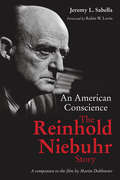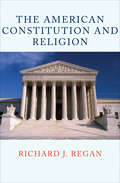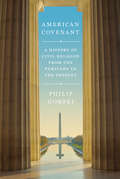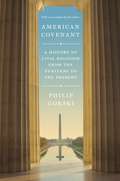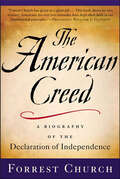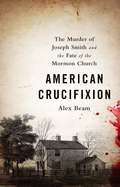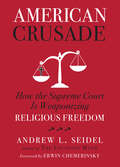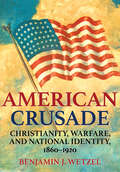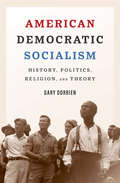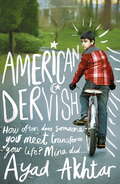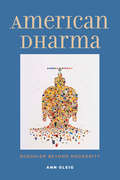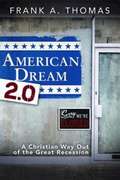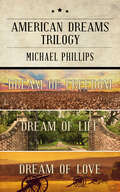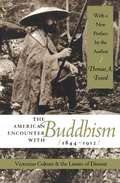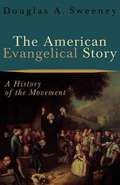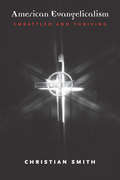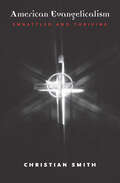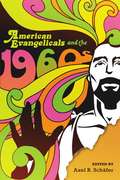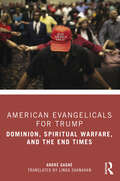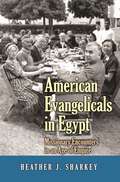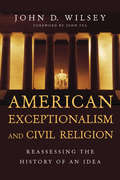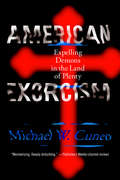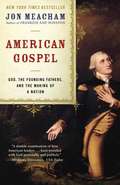- Table View
- List View
An American Conscience: The Reinhold Niebuhr Story
by Jeremy L. SabellaReinhold Niebuhr (1892–1971) was an inner-city pastor, ethics professor, and author of the famous Serenity Prayer. Time magazine's 25th anniversary issue in March 1948 featured Niebuhr on its cover, and Time later eulogized him as "the greatest Protestant theologian in America since Jonathan Edwards." Cited as an influence by public figures ranging from Billy Graham to Barack Obama, Niebuhr was described by historian Arthur Schlesinger Jr. as "the most influential American theologian of the twentieth century." In this companion volume to the forthcoming documentary film by Martin Doblmeier on the life and influence of Reinhold Niebuhr, Jeremy Sabella draws on an unprecedented set of exclusive interviews to explore how Niebuhr continues to compel minds and stir consciences in the twenty-first century. Interviews with leading voices such as Jimmy Carter, David Brooks, Cornel West, and Stanley Hauerwas as well as with people who knew Niebuhr personally, including his daughter Elisabeth, provide a rich trove of original material to help readers understand Niebuhr's enduring impact on American life and thought.CONTRIBUTORS (interviewees) Andrew J. Bacevich David Brooks Lisa Sowle Cahill Jimmy Carter Gary Dorrien Andrew Finstuen K. Healan Gaston Stanley Hauerwas Susannah Heschel William H. Hudnut III Robin W. Lovin Fr. Mark S. Massa, SJ Elisabeth Sifton Ronald H. Stone Cornel West Andrew Young
An American Conscience: The Reinhold Niebuhr Story
by Jeremy L. SabellaReinhold Niebuhr (1892–1971) was an inner-city pastor, ethics professor, and author of the famous Serenity Prayer. Time magazine's 25th anniversary issue in March 1948 featured Niebuhr on its cover, and Time later eulogized him as "the greatest Protestant theologian in America since Jonathan Edwards." Cited as an influence by public figures ranging from Billy Graham to Barack Obama, Niebuhr was described by historian Arthur Schlesinger Jr. as "the most influential American theologian of the twentieth century." In this companion volume to the forthcoming documentary film by Martin Doblmeier on the life and influence of Reinhold Niebuhr, Jeremy Sabella draws on an unprecedented set of exclusive interviews to explore how Niebuhr continues to compel minds and stir consciences in the twenty-first century. Interviews with leading voices such as Jimmy Carter, David Brooks, Cornel West, and Stanley Hauerwas as well as with people who knew Niebuhr personally, including his daughter Elisabeth, provide a rich trove of original material to help readers understand Niebuhr's enduring impact on American life and thought.CONTRIBUTORS (interviewees) Andrew J. Bacevich David Brooks Lisa Sowle Cahill Jimmy Carter Gary Dorrien Andrew Finstuen K. Healan Gaston Stanley Hauerwas Susannah Heschel William H. Hudnut III Robin W. Lovin Fr. Mark S. Massa, SJ Elisabeth Sifton Ronald H. Stone Cornel West Andrew Young
The American Constitution and Religion
by Richard J. ReganA &“highly informative and enjoyable&” study of Supreme Court cases involving the place of religion in society (Nicholas P. Cafardi, America Magazine). The Supreme Court&’s decisions concerning the first amendment are hotly debated, and the controversy shows no signs of abating. Adding much-needed historical and philosophical background to the discussion, Richard J. Regan reconsiders some of the most important Supreme Court cases regarding the establishment clause and the free exercise of religion. Governmental aid to church-affiliated elementary schools and colleges; state-sponsored prayer and Bible reading; curriculum that includes creationism; tax exemption of church property; publicly sponsored Christmas displays—these and other notable cases are discussed in Regan&’s chapters on the religious establishment clause. On the topic of the free-exercise clause, Regan considers such subjects as the value of religious freedom, as well as the place of religious beliefs in public schooling and government affairs. Important cases concerning conscientious objection to war, regulation of religious organizations and personnel, and western traditions of conscience are also examined. This book, written for students of law, political science, and religion, presents the relevant case law in chronological order. The addition of the historical context and Regan&’s philosophical discussion enhances our understanding of these influential cases.
American Covenant: A History of Civil Religion from the Puritans to the Present
by Philip GorskiWas the United States founded as a Christian nation or a secular democracy? Neither, argues Philip Gorski in American Covenant. What the founders actually envisioned was a prophetic republic that would weave together the ethical vision of the Hebrew prophets and the Western political heritage of civic republicanism. In this ambitious book, Gorski shows why this civil religious tradition is now in peril—and with it the American experiment.Gorski traces the historical development of prophetic republicanism from the Puritan era to the present day. He provides close readings of thinkers such as John Winthrop, Thomas Jefferson, Frederick Douglass, W.E.B. Du Bois, and Hannah Arendt, along with insightful portraits of recent and contemporary religious and political leaders such as Jerry Falwell, Pat Robertson, Ronald Reagan, George W. Bush, and Barack Obama. Gorski shows how the founders' original vision for America is threatened by an internecine struggle between two rival traditions, religious nationalism and radical secularism. Religious nationalism is a form of militaristic hyperpatriotism that imagines the United States as a divine instrument in the final showdown between good and evil. Radical secularists fervently deny the positive contributions of the Judeo-Christian tradition to the American project and seek to remove all traces of religious expression from the public square. Gorski offers an unsparing critique of both, demonstrating how half a century of culture war has drowned out the quieter voices of the vital center.American Covenant makes the compelling case that if we are to rebuild that vital center, we must recover the civil religious tradition on which the republic was founded.
American Covenant: A History of Civil Religion from the Puritans to the Present
by Philip GorskiThe long battle between exclusionary and inclusive versions of the American storyWas America founded as a Christian nation or a secular democracy? Neither, argues Philip Gorski in American Covenant. What the founders envisioned was a prophetic republic that would weave together the ethical vision of the Hebrew prophets and the Western political heritage of civic republicanism. In this eye-opening book, Gorski shows why this civil religious tradition is now in peril—and with it the American experiment.American Covenant traces the history of prophetic republicanism from the Puritan era to today, providing insightful portraits of figures ranging from John Winthrop and W.E.B. Du Bois to Jerry Falwell, Ronald Reagan, and Barack Obama. Featuring a new preface by the author, this incisive book demonstrates how half a century of culture war has drowned out the quieter voices of the vital center, and demonstrates that if we are to rebuild that center, we must recover the civil religious tradition on which the republic was founded.
The American Creed: A Biography of the Declaration of Independence
by Forrest ChurchWhat makes us all Americans--whatever our differences--is adherence to a creed, a creed based upon cornerstone truths the founders believed "self-evident." From the earliest days, the survival of the new republic hinged not merely upon the expression of these grand principles of liberty and equality but upon their spiritual underpinnings. Freedom and faith were intertwined. America, as a foreign observer once put it, is a nation with the soul of a church.In this stirring and timely book, Forrest Church charts the progress of this creed from the America's beginnings to the present day by evoking those whose words-whether in declarations, songs, inaugural addresses, speeches, or prayers-have expressed its letter and captured its spirit. What emerges is our shared destiny. Martin Luther King, Jr.'s dream that this country might someday "rise up and live out the true meaning of its creed," echoes Thomas Jefferson's belief that "equal and exact justice to all" is the "creed of our political faith." Our connection with the past represents our commitment to the future and vice versa. A "spiritual and patriotic primer," The American Creed distills the essence of American history while also matching its sweep. Church lets the story of the Declaration of Independence unfold before our eyes, giving us both the big picture and the details that place it into brilliant focus. Those steeped in our nation's heritage will find fresh insight and renewed purpose. Those still discovering its riches could have no finer introduction. In its scope and embrace, this is a book for us all.
American Crucifixion: The Murder of Joseph Smith and the Fate of the Mormon Church
by Alex BeamOn June 27, 1844, a mob stormed the jail in the dusty frontier town of Carthage, Illinois. Clamorous and angry, they were hunting down a man they saw as a grave threat to their otherwise quiet lives: the founding prophet of Mormonism, Joseph Smith. They wanted blood. At thirty-nine years old, Smith had already lived an outsized life. In addition to starting his own religion and creating his own "Golden Bible”--the Book of Mormon--he had worked as a water-dowser and treasure hunter. He’d led his people to Ohio, then Missouri, then Illinois, where he founded a city larger than fledgling Chicago. He was running for president. And, secretly, he had married more than thirty women. In American Crucifixion, Alex Beam tells how Smith went from charismatic leader to public enemy: How his most seismic revelation--the doctrine of polygamy--created a rift among his peop≤ how that schism turned to violence; and how, ultimately, Smith could not escape the consequences of his ambition and pride. Mormonism is America’s largest and most enduring native religion, and the "martyrdom” of Joseph Smith is one of its transformational events. Smith’s brutal assassination propelled the Mormons to colonize the American West and claim their place in the mainstream of American history. American Crucifixion is a gripping story of scandal and violence, with deep roots in our national identity.
American Crusade: How the Supreme Court Is Weaponizing Religious Freedom
by Andrew L SeidelIs a fight against equality and for privilege a fight for religious supremacy? Andrew L. Seidel, a constitutional attorney and author of the critically acclaimed book The Founding Myth: Why Christian Nationalism Is Un-American, dives into the debate on religious liberty, the modern attempt to weaponize religious freedom, and the Supreme Court's role in that &“crusade.&” Seidel examines some of the key Supreme Court cases of the last thirty years—including Masterpiece Cakeshop v. Colorado Civil Rights Commission (a bakery that refused to make a wedding cake for a gay couple), Trump v. Hawaii (the anti-Muslim travel ban case), American Legion v. American Humanist Association (related to a group maintaining a 40-foot Christian cross on government-owned land), and Tandon v. Newsom (a Santa Clara Bible group exempted from Covid health restrictions), as well as the recent overturning of Roe v. Wade—and how a hallowed legal protection, freedom of religion, has been turned into a tool to advance privilege and impose religion on others. This is a meticulously researched and deeply insightful account of our political landscape with a foreword provided by noted constitutional scholar Erwin Chemerinsky, author of The Case Against the Supreme Court.The issue of church versus state is more relevant than ever in today&’s political climate and with the conservative majority status of the current Supreme Court. This book is a standout on the shelf for fans of Michelle Alexander, Bob Woodward, and Christopher Hitchens. Readers looking for critiques of the rise of Christian nationalism, like Jesus and John Wayne, and examinations like How Democracies Die will devour Seidel's analysis.Hardcover with dust jacket; 320 pages; 9 in H by 6 in W.
American Crusade: Christianity, Warfare, and National Identity, 1860–1920
by Benjamin J. WetzelWhen is a war a holy crusade? And when does theology cause Christians to condemn violence? In American Crusade, Benjamin Wetzel argues that the Civil War, the Spanish-American War, and World War I shared a cultural meaning for white Protestant ministers in the United States, who considered each conflict to be a modern-day crusade. American Crusade examines the "holy war" mentality prevalent between 1860 and 1920, juxtaposing mainline Protestant support for these wars with more hesitant religious voices: Catholics, German-speaking Lutherans, and African American Methodists. The specific theologies and social locations of these more marginal denominations made their ministries highly critical of the crusading mentality. Religious understandings of the nation, both in support of and opposed to armed conflict, played a major role in such ideological contestation. Wetzel's book questions traditional periodizations and suggests that these three wars should be understood as a unit. Grappling with the views of America's religious leaders, supplemented by those of ordinary people, American Crusade provides a fresh way of understanding the three major American wars of the late nineteenth and early twentieth centuries.
American Democratic Socialism: History, Politics, Religion, and Theory
by Gary DorrienA sweeping, ambitious history of American democratic socialism from one of the world&’s leading intellectual historians and social ethicists &“Dorrien is supremely qualified for the task he has set himself in this very thoughtful, necessary, and timely book.&”—Maurice Isserman, author of The Other American: The Life of Michael Harrington Democratic socialism is ascending in the United States as a consequence of a widespread recognition that global capitalism works only for a minority and is harming the planet&’s ecology. This history of American democratic socialism from its beginning to the present day interprets the efforts of American socialists to address and transform multiple intersecting sites of injustice and harm. Comprehensive, deeply researched, and highly original, this book offers a luminous synthesis of secular and religious socialisms, detailing both their intellectual and their organizational histories.
American Dervish: From the winner of the Pulitzer Prize
by Ayad AkhtarTHE EXPLOSIVE NOVEL FROM PULITZER PRIZE WINNER AYAD AKHTAR'Terrific' The Times'Extraordinary' Sunday Express'A great American story' MetroHOW OFTEN DOES SOMEONE YOU MEET TRANSFORM YOUR LIFE?Hayat Shah was captivated by Mina long before he met her: his mother's beautiful, brilliant friend is a family legend. When he learns that Mina is leaving Pakistan to live with the Shahs in America, Hayat is thrilled.Hayat's father is less enthusiastic. Ever wary of fundamentalism, he doesn't relish the idea of Mina's fervid devotion under his roof. What no one expects is that when Mina shows Hayat the beauty of the Quran, it will utterly transform him.Mina's real magic may be that the Shah household becomes a happy one. But when Mina catches the eye of a Jewish doctor and family friend, Hayat's jealousy is inflamed by the community's anti-Semitism - and he acts with catastrophic consequences for those he loves most. A DEVASTATINGLY MOVING NOVEL FROM ONE OF AMERICA'S MOST EXCITING WRITERSA Kirkus Reviews Best Book of the YearA Globe and Mail Best Book of the YearA Shelf Awareness Best Book of the YearAn O, the Oprah Magazine Book of the Year
American Dharma: Buddhism Beyond Modernity
by Ann GleigThe past couple of decades have witnessed Buddhist communities both continuing the modernization of Buddhism and questioning some of its limitations. In this fascinating portrait of a rapidly changing religious landscape, Ann Gleig illuminates the aspirations and struggles of younger North American Buddhists during a period she identifies as a distinct stage in the assimilation of Buddhism to the West. She observes both the emergence of new innovative forms of deinstitutionalized Buddhism that blur the boundaries between the religious and secular, and a revalorization of traditional elements of Buddhism such as ethics and community that were discarded in the modernization process. Based on extensive ethnographic and textual research, the book ranges from mindfulness debates in the Vipassana network to the sex scandals in American Zen, while exploring issues around racial diversity and social justice, the impact of new technologies, and generational differences between baby boomer, Gen X, and millennial teachers.
American Dream: Four Historical Love Stories
by Judith Mccoy Miller Sally Laity Nancy J. Farrier Kristy Dykes[From the back cover:] New homeland... new lifestyle... new love. Lofty dreams of a new and better life lured untold thousands to America. Among those "huddled masses yearning to breathe free" are four immigrant women facing the challenges of the untamed New World. Will they have the strength and faith to meet the trials ahead? Life in the wilds of Florida as a ready-made wife and mother must be better than living on the streets of Boston, but not everyone is cut out for pioneer life. Will Corinn be willing to say, "I Take Thee, a Stranger," in order to survive in the New World? Paloma wants to find her sister in Tucson and convince her to move back to Mexico, but a handsome blacksmith keeps barring her path. Can Blessed Land be found among the Americans Paloma despises? Kiera feels she must return home to Ireland when her dreams for a new life have died, but she has found a new friend who wants nothing more than to show her that God still keeps His promises. Are Promises Kept in America? Hannah's new hope seems to have come in the form of her widowhood, but now another man is trying to dictate the future she has entrusted to God. Will Hannah hear Freedom's Ring? Can these four unique women find their American Dream? Can the promise of freedom carry them through to a new life of love? You will thrill to the strength, courage, and tenacity of these four women determined to choose God's path in the New Land.
American Dream 2.0: A Christian Way Out of the Great Recession
by Frank A. ThomasThe promise of America has always been creative potential: enterprise, industry, optimism, idealism, and hope. This promise, known since the beginning of the New World and named since the Great Depression as the "American Dream", is what makes immigrants cry at the base of the Statue of Liberty. But there is a dark side to the American Dream, too--one that we don't talk about much in polite company. A side characterized by the exploitation and domination of subjected people. The national climate has caused many to question the validity of the American Dream, and whether it even offers a viable vision for the nation. There are few greater questions to ask. Our collective future depends on a common vision. If the American Dream is dead, then what happens next? This book evaluates the American Dream, establishes its roots, gives reasons for its decline, and offers solutions to reclaim the promise of the American Dream that is more aligned with Jesus' vision of the kingdom of God and Martin Luther King Jr' s vision of the "Beloved Community". Our challenge is to develop a redesigned American Dream, a sustainable future for all, free from exploitation and domination of subjected people.
American Dreams Trilogy: Dream of Freedom, Dream of Life, and Dream of Love
by Michael PhillipsAll three novels in the acclaimed Christian author’s historical fiction series about a Southern family following God’s will as Civil War tensions rise.Dream of FreedomIn the pre-Civil War South, Richmond Davidson and his family decide to follow God’s will and free their slaves. The controversy over this decision sets off escalating tensions as the lines are being drawn between North and South.Dream of LifeWhen the Underground Railroad hears that the Davidson family home is a potential safe house, runaways began appearing at their door. Unable to turn them away, the Davidsons must find a way to help. But the prying eyes of neighbors make this a dangerous calling.Dream of LoveAs the Civil War rages, the Davidsons continue their work with the Underground Railroad. But as one son fights for the Confederacy while another has gone North, the family will face its most difficult trials yet.
The American Encounter with Buddhism, 1844-1912
by Thomas A. TweedIn this landmark work, Thomas Tweed examines nineteenth-century America's encounter with one of the world's major religions. Exploring the debates about Buddhism that followed upon its introduction in this country, Tweed shows what happened when the transplanted religious movement came into contact with America's established culture and fundamentally different Protestant tradition. The book, first published in 1992, traces the efforts of various American interpreters to make sense of Buddhism in Western terms. Tweed demonstrates that while many of those interested in Buddhism considered themselves dissenters from American culture, they did not abandon some of the basic values they shared with their fellow Victorians. In the end, the Victorian understanding of Buddhism, even for its most enthusiastic proponents, was significantly shaped by the prevailing culture. Although Buddhism attracted much attention, it ultimately failed to build enduring institutions or gain significant numbers of adherents in the nineteenth century. Not until the following century did a cultural environment more conducive to Buddhism's taking root in America develop. In a new preface, Tweed addresses Buddhism's growing influence in contemporary American culture.
The American Evangelical Story: A History Of The Movement
by Douglas A. SweeneyThe American Evangelical Story surveys the role American evangelicalism has had in the shaping of global evangelical history. Author Douglas Sweeney begins with a brief outline of the key features that define evangelicals and then explores the roots of the movement in English Pietism and the Great Awakening of the eighteenth century. He goes on to consider the importance of missions in the development of evangelicalism and the continuing emphasis placed on evangelism. Sweeney next examines the different subgroups of American evangelicals and the current challenges faced by the movement, concluding with reflections on the future of evangelicalism. Combining a narrative style with historical detail and insight, this accessible, illustrated book will appeal to readers interested in the history of the movement, as well as students of church history.
American Evangelicalism: Embattled and Thriving
by Christian SmithEvangelicalism is one of the strongest religious traditions in America today; 20 million Americans identify themselves with the evangelical movement. Given the modern pluralistic world we live in, why is evangelicalism so popular? Based on a national telephone survey and more than three hundred personal interviews with evangelicals and other churchgoing Protestants, this study provides a detailed analysis of the commitments, beliefs, concerns, and practices of this thriving group. Examining how evangelicals interact with and attempt to influence secular society, this book argues that traditional, orthodox evangelicalism endures not despite, but precisely because of, the challenges and structures of our modern pluralistic environment. This work also looks beyond evangelicalism to explore more broadly the problems of traditional religious belief and practice in the modern world. With its impressive empirical evidence, innovative theory, and substantive conclusions, American Evangelicalism will provoke lively debate over the state of religious practice in contemporary America.
American Evangelicalism: Embattled and Thriving
by Christian Smith Michael Emerson Sally Gallagher Paul Kennedy David Sikkink&“An excellent study of evangelicalism&” from the award-winning sociologist and author of Souls in Transition and Soul Searching (Library Journal). Evangelicalism is one of the strongest religious traditions in America today; twenty million Americans identify themselves with the evangelical movement. Given the modern pluralistic world we live in, why is evangelicalism so popular? Based on a national telephone survey and more than three hundred personal interviews with evangelicals and other churchgoing Protestants, this study provides a detailed analysis of the commitments, beliefs, concerns, and practices of this thriving group. Examining how evangelicals interact with and attempt to influence secular society, this book argues that traditional, orthodox evangelicalism endures not despite, but precisely because of, the challenges and structures of our modern pluralistic environment. This work also looks beyond evangelicalism to explore more broadly the problems of traditional religious belief and practice in the modern world. With its impressive empirical evidence, innovative theory, and substantive conclusions, American Evangelicalism will provoke lively debate over the state of religious practice in contemporary America. &“Based on a three-year study of American evangelicals, Smith takes the pulse of contemporary evangelicalism and offers substantial evidence of a strong heartbeat . . . Evangelicalism is thriving, says Smith, not by being countercultural or by retreating into isolation but by engaging culture at the same time that it constructs, maintains and markets its subcultural identity. Although Smith depends heavily on sociological theory, he makes his case in an accessible and persuasive style that will appeal to a broad audience.&” —Publishers Weekly
American Evangelicals and the 1960s
by Axel R. SchäferIn the late 1970s, the New Christian Right emerged as a formidable political force, boldly announcing itself as a unified movement representing the views of a "moral majority. " But that movement did not spring fully formed from its predecessors. American Evangelicals and the 1960s refutes the thesis that evangelical politics were a purely inflammatory backlash against the cultural and political upheaval of the decade. Bringing together fresh research and innovative interpretations, this book demonstrates that evangelicals actually participated in broader American developments during "the long 1960s," that the evangelical constituency was more diverse than often noted, and that the notion of right-wing evangelical politics as a backlash was a later creation serving the interests of both Republican-conservative alliances and their critics. Evangelicalisms involvement with rather than its reaction against the main social movements, public policy initiatives, and cultural transformations of the 1960s proved significant in its 1970s political ascendance. Twelve essays that range thematically from the oil industry to prison ministry and from American counterculture to the Second Vatican Council depict modern evangelicalism both as a religious movement with its own internal dynamics and as one fully integrated into general American history.
American Evangelicals for Trump: Dominion, Spiritual Warfare, and the End Times
by André GagnéThis book introduces the American Evangelical movement and the role it played in the support of Donald Trump. Specifically, it focuses on the Neocharismatic-Pentecostal (NCP) leaders, their beliefs, and their political strategies. The author examines why 81% of white evangelicals voted for Trump in 2016, and why he still received between 76% and 81% of their vote in 2020 despite losing the presidency. Additionally, the book discusses how NCP leaders are part of the Christian Right, a religious coalition with a political agenda centered on controversial issues such as anti-abortion activism, opposition to LGBTQ+ rights, and the protection of religious freedom. Structured around the three main ideas inspiring NCP leaders who supported Trump in 2016 and 2020—Dominion, Spiritual Warfare, and Eschatology (the End Times)—the book examines how these ideas have sustained the evangelicals close to U.S. political power in the Trump era. In light of the potential for Trump's return to power in 2024, the book serves as a warning of what a renewed alliance between Trump and his former NCP supporters could bring. It is an essential read for all students and researchers of Evangelicalism, Religion in America, Political Theology, or Religion and Politics.
American Evangelicals in Egypt: Missionary Encounters in an Age of Empire (Jews, Christians, and Muslims from the Ancient to the Modern World #56)
by Heather J. SharkeyIn 1854, American Presbyterian missionaries arrived in Egypt as part of a larger Anglo-American Protestant movement aiming for worldwide evangelization. Protected by British imperial power, and later by mounting American global influence, their enterprise flourished during the next century. American Evangelicals in Egypt follows the ongoing and often unexpected transformations initiated by missionary activities between the mid-nineteenth century and 1967--when the Six-Day Arab-Israeli War uprooted the Americans in Egypt. Heather Sharkey uses Arabic and English sources to shed light on the many facets of missionary encounters with Egyptians. These occurred through institutions, such as schools and hospitals, and through literacy programs and rural development projects that anticipated later efforts of NGOs. To Egyptian Muslims and Coptic Christians, missionaries presented new models for civic participation and for women's roles in collective worship and community life. At the same time, missionary efforts to convert Muslims and reform Copts stimulated new forms of Egyptian social activism and prompted nationalists to enact laws restricting missionary activities. Faced by Islamic strictures and customs regarding apostasy and conversion, and by expectations regarding the proper structure of Christian-Muslim relations, missionaries in Egypt set off debates about religious liberty that reverberate even today. Ultimately, the missionary experience in Egypt led to reconsiderations of mission policy and evangelism in ways that had long-term repercussions for the culture of American Protestantism.
American Exceptionalism and Civil Religion: Reassessing the History of an Idea
by John Fea John D. WilseyEver since John Winthrop told his fellow colonists in 1630 that they were about to establish a City upon a Hill, the idea of having a special place in history has captured the American imagination. Through centuries of crises and opportunities, many have taken up this theme to inspire the nation. But others have criticized the notion because it implies a sense of superiority which can fuel racism, warmongering and even idolatry. In this remarkable book, John Wilsey traces the historical development of exceptionalism, including its theological meaning and implications for civil religion. From seventeenth-century Puritans to twentieth-century industrialists, from politicians to educators, exceptionalism does not appear as a monolithic concept to be either totally rejected or devotedly embraced. While it can lead to abuses, it can also point to constructive civil engagement and human flourishing. This book considers historically and theologically what makes the difference. Neither the term nor the idea of American exceptionalism is going away. John Wilsey's careful history and analysis will therefore prove an important touchstone for discussions of American identity in the decades to come.
American Exorcism: Expelling Demons In The Land Of Plenty
by Michael W. CuneoConducted by officially appointed exorcists or by maverick priests sidestepping Christian sanctions, by evangelical ministers and Episcopal charismatics, the ancient rite of exorcism is flourishing in the new millennium. In New York alone, four priests have, since 1995, officially investigated over 40 cases of suspected demonic possession, the Archdiocese of Chicago has appointed its first full-time exorcist in over 160 years while exorcists have appeared on television, courtesy of the likes of Oprah Winfrey and Larry King. Written with objectivity, insight and a healthy amount of irony, AMERICAN EXORCISM is an inside look at this - to some extraordinary, to others preposterous and to many, terrifying - phenomenon. Having attended over 50 exorcisms in person, and interviewed many of the participants - both the exorcists and those who believed themselves to be possessed - Michael Cuneo explores this netherworld of American, and ergo, British, life, and reflects on the meaning of exorcism in the 21st century, and on the relationship between religious ritual and popular culture. As well recounting in gripping detail the ceremonies he witnessed, he touches on such provocative topics as the 'satanic panics' of the 1980s, repressed memory and ritual abuse. The result is a remarkably revealing, entertaining and fascinating work of cultural commentary.
American Gospel: God, the Founding Fathers, and the Making of a Nation
by Jon MeachamThe American Gospel–literally, the good news about America–is that religion shapes our public life without controlling it. In this vivid book, New York Times bestselling author Jon Meacham tells the human story of how the Founding Fathers viewed faith, and how they ultimately created a nation in which belief in God is a matter of choice.At a time when our country seems divided by extremism, American Gospel draws on the past to offer a new perspective. Meacham re-creates the fascinating history of a nation grappling with religion and politics–from John Winthrop’s “city on a hill” sermon to Thomas Jefferson’s Declaration of Independence; from the Revolution to the Civil War; from a proposed nineteenth-century Christian Amendment to the Constitution to Martin Luther King, Jr.’s call for civil rights; from George Washington to Ronald Reagan.Debates about religion and politics are often more divisive than illuminating. Secularists point to a “wall of separation between church and state,” while many conservatives act as though the Founding Fathers were apostles in knee britches. As Meacham shows in this brisk narrative, neither extreme has it right. At the heart of the American experiment lies the God of what Benjamin Franklin called “public religion,” a God who invests all human beings with inalienable rights while protecting private religion from government interference. It is a great American balancing act, and it has served us well.Meacham has written and spoken extensively about religion and politics, and he brings historical authority and a sense of hope to the issue. American Gospel makes it compellingly clear that the nation’s best chance of summoning what Lincoln called “the better angels of our nature” lies in recovering the spirit and sense of the Founding. In looking back, we may find the light to lead us forward.
